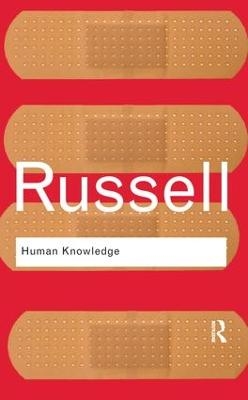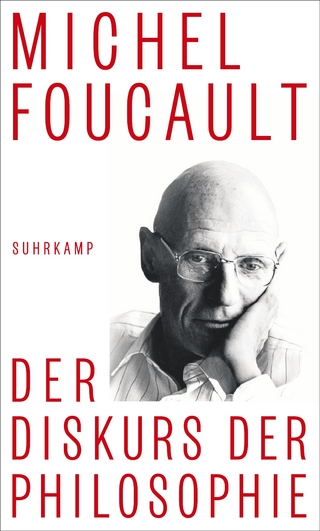
Human Knowledge: Its Scope and Limits
Routledge (Verlag)
978-1-138-45754-6 (ISBN)
How do we know what we "know"? How did we �as individuals and as a society � come to accept certain knowledge as fact? In Human Knowledge, Bertrand Russell questions the reliability of our assumptions on knowledge. This brilliant and controversial work investigates the relationship between �individual� and �scientific� knowledge. First published in 1948, this provocative work contributed significantly to an explosive intellectual discourse that continues to this day.
Bertrand Russell (1872-1970). The leading British Philosopher of the twentieth century, who made major contributions to the area of logic and epistemology. Politically active and habitually outspoken, his ethical principles twice lead to imprisonment
Introduction; Part 1 The World of Science; Chapter I-1 Individual and Social Knowledge; Chapter I-2 The Universe of Astronomy; Chapter I-3 The World of Physics; Chapter I-4 Biological Evolution; Chapter I-5 The Physiology of Sensation and Volition; Chapter I-6 The Science of Mind; Part 2 Language; Chapter II-1 The Uses of Language; Chapter II-2 Ostensive Definition; Chapter II-3 Proper Names; Chapter II-4 Egocentric Particulars; Chapter II-5 Suspended Reactions: Knowledge and Belief; Chapter II-6 Sentences; Chapter II-7 External Reference of Ideas and Beliefs; Chapter II-8 Truth: Elementary Forms; Chapter II-9 Logical Words and Falsehood; Chapter II-10 General Knowledge; Chapter II-11 Fact, Belief, Truth, and Knowledge; Part 3 Science and Perception; introduction3 Introduction; Chapter III-1 Knowledge of Facts and Knowledge of Laws; Chapter III-2 Solipsism; Chapter III-3 Probable Inference in Common-Sense Practice; Chapter III-4 Physics and Experience; Chapter III-5 Time in Experience; Chapter III-6 Space in Psychology; Chapter III-7 Mind and Matter; Part 4 Scientific Concepts; Chapter IV-1 Interpretation; Chapter IV-2 Minimum Vocabularies; Chapter IV-3 Structure; Chapter IV-4 Structure and Minimum Vocabularies; Chapter IV-5 Time, Public and Private; Chapter IV-6 Space in Classical Physics; Chapter IV-7 Space–Time; Chapter IV-8 The Principle of Individuation; Chapter IV-9 Causal Laws; Chapter IV-10 Space–Time and Causality; Part 5 Probability; introduction5 Introduction; Chapter V-1 Kinds of Probability; Chapter V-2 Mathematical Probability; Chapter V-3 The Finite-Frequency Theory; Chapter V-4 The Mises–Reichenbach Theory; Chapter V-5 Keynes's Theory of Probability; Chapter V-6 Degrees of Credibility; Chapter V-7 Probability and Induction; Part 6 Postulates of Scientific Inference; Chapter VI-1 Kinds of Knowledge; Chapter VI-2 The Role of Induction; Chapter VI-3 The Postulate of Natural Kinds, or of Limited Variety; Chapter VI-4 Knowledge Transcending Experience; Chapter VI-5 Causal Lines; Chapter VI-6 Structure and Causal Laws; Chapter VI-7 Interaction; Chapter VI-8 Analogy; Chapter VI-9 Summary of Postulates; Chapter VI-10 The Limits of Empiricism;
| Erscheinungsdatum | 07.08.2017 |
|---|---|
| Reihe/Serie | Routledge Classics |
| Verlagsort | London |
| Sprache | englisch |
| Maße | 138 x 216 mm |
| Gewicht | 453 g |
| Themenwelt | Geisteswissenschaften ► Philosophie ► Philosophie der Neuzeit |
| ISBN-10 | 1-138-45754-X / 113845754X |
| ISBN-13 | 978-1-138-45754-6 / 9781138457546 |
| Zustand | Neuware |
| Informationen gemäß Produktsicherheitsverordnung (GPSR) | |
| Haben Sie eine Frage zum Produkt? |
aus dem Bereich


